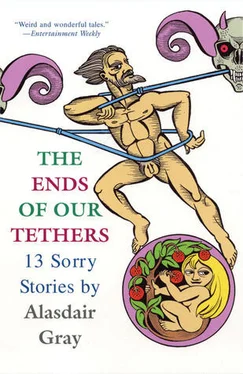“What happened to your face, Luke?”
“Oh, I had an argument in a pub with a man who glassed me so it became a police matter. I mean the police took me in and gave me a doing before turning me out. But it was all just usual reality, it doesnae matter. Have you read The American Claimant yet?”
“Not yet. Can I buy you a drink?”
I said this because we were in a street very far from where we might be seen by people I know.
After two unsuccessful attempts we found a pub that would serve him and sat with pints in a quiet corner. I admitted I had not yet read Two Gentlemen of Verona and steered the talk away from literature by asking if he ever saw his wife nowadays. “Neither her nor my son. In fact she kicked me out before he was born because she hated the name I was going to give him — a lovely name it was too, a perfect poem in itself: Tristram Pilgrim Aiblins .” He announced the name with great enthusiasm then repeated it slowly as if separately enjoying each syllable, then he asked if I knew what it meant.
“ Tristram means sadly born ,” I said, “I’m not surprised the mother didn’t want her boy called that.”
“You’ve forgotten what Aiblins means. That makes a difference.”
“What does Aiblins mean?”
“Look it up, wordsmith,” he said, laughing. “Consult a Lallans dictionary, you antique Scottish nebula.”
“But how did you know a son was coming before he got born?”
He tapped his brow saying, “I heard it in here.”
I asked if his inner voice ever gave him poetry nowadays. He said, “I think it’s trying to. Sometimes a good line gets through but never a whole couplet or verse because the government is jamming me.”
“The government? How?”
“It keeps sending other voices into my head, loud ones that accuse me of terrible things I’ve never done, never even imagined doing. Why? Why should the government spend money on elaborate broadcasting equipment just to torture me with false accusations only I can hear? It makes no sense. It’s a total waste of taxpayers’ money.” He did not say this angrily or miserably but with a kind of puzzled amusement. I said, “Some people in high places must think you very dangerous.”
“Yes, but why?”
“Tell me a line your inner voice has given you recently.”
He pressed a finger to the side of his brow and after a while said, “ Since breathing is my life, to stop I dare not dare .”
“I like that line. Any more?”
“Er … Great vessels sink, while piss-pots stay afloat .”
“Better and better. Do you still think I’m a piss-pot?”
He grinned apologetically and murmured, “If the cap fits … Oh, here’s another coming through: To die, to me, today, is like returning home from a war .”
“That’s the best line of all. You’re still a poet, Luke, in a fragmentary way.”
“The government must want to keep me fragmentary. Has your inspiration ever been broken up by outside broadcasting?” “No.”
On his discoloured, distorted face appeared a smile of pure childish happiness mingled with sly mischief.
“Your work isn’t good enough to frighten them,” he murmured and gave my shoulder a consoling pat.
“True. I must leave now.”
I gave him money that he tranquilly accepted. I hurried away in a state very near panic. By pretending to share his world view I had almost been convinced by it. I was glad to learn later that the dare not dare line came from the introduction to John Lennon’s In His Own Write , that the sunk ship and floating piss-pots were from a translation of a Gaelic proverb in one of McDiarmid’s most rambling monologues. I haven’t found the source of the third, which may be a genuine Aiblins invention. But I am afraid to re-examine the verses in the creased folder in my lobby cupboard, afraid to show them to people who might judge them differently. It might emerge that I have driven a great poet insane by suppressing his earliest works.
For the same reason I fear
to destroy them.


WHEN LONDON WAS ADVERTISED Was the world’s fashion capital — when The Beatles seemed the nation’s greatest export — when a Conservative prime minister with a Scottish name said, probably truthfully, that the British people had never been so prosperous, two such people went for a weekend camping holiday in the Highlands.
They were building workers of seventeen and eighteen who lived with their parents in the town of Dumbarton. On Friday night after work they packed the panniers of their motorbikes, rode up the Vale of Leven, took the shore road by Loch Lomond to Tarbert, turned west to the head of Loch Long then zoomed over The Rest-and-Be-Thankful. As darkness fell they passed through the Highland’s only neat little eighteenth-century town and began looking for a camping place. There was a sea loch to their left, hedged fields to the right, and after a mile or two they saw a side road with a wide grassy verge. Here they stopped, spread a groundsheet, erected a tent and put the motorbikes inside. This left enough room to lay down sleeping bags with the panniers for pillows. Then they tied the tent flaps shut, walked back to the town and spent a pleasant evening in the bar of a small hotel.
There are many tales of Scottish country pubs serving drink after the legal closing time. This was one such pub. The boys, cheerfully drunk, left it after midnight and returned to the tent through a mild but sobering rain shower. They sobered completely on finding the tent flaps wide open and nothing but the groundsheet inside. They discussed returning to the town and phoning the police but gloomily decided that a Highland policeman might be hard to rouse at that hour, especially if the rousers were urban youths smelling of drink. They agreed to do nothing before daylight and spent a miserable night huddled in their leather clothes back to back on the groundsheet.
At eight in the morning they were themselves roused by a man wearing well-cut tweed clothes and accompanied by a policeman. To the boys this man seemed very tall and fresh-faced, perhaps because they felt tired and dirty. He said, “You have insolently camped upon my land without asking my permission. What have you to say for yourselves?”
The elder boy said they didn’t know that the roadside was not public, also that their motorbikes and other things had been stolen.
“Not stolen. Impounded,” said the man, “I had them removed last night to the police station. You can thank your lucky stars that I was kind enough to leave you the tent. So now dismantle it, collect your chattels from the station and clear out. I do not object, as a rule, to visitors who behave properly and drop no litter. I regard this —” he indicated the tent — “as a form of litter. I have a friend, a very brave soldier who had similar trouble with a family of people like you. Well, he discovered their address, went with a friend to the municipal housing scheme where they lived and pitched a tent of his own in the middle of their back garden. They didn’t like that one little tiny bit. Quite annoyed about it they were as a matter of fact.”
The man turned a little and looked steadily
toward the loch, mountains, glens, rivers,
moors and islands that he regarded
(with the support of the police)
as his back garden.

Читать дальше














